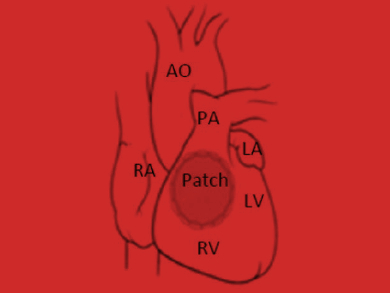Heart defects often require surgically placed patches. The materials that are currently used are effective in the short term, but since the patches are not biodegradable and do not grow with the patient, they often need replacement later on. In addition, they act as a foreign body and can lead to higher risks of inflammation, infection, and heart failure.
Jeffrey G. Jacot, Rice University, Texas Children’s Hospital, both Houston, TX, USA, and University of Colorado Denver, Anschutz Medical Campus, Aurora, CO, USA, and colleagues have developed a biodegradable and biocompatible multilayered patch with high mechanical strength for heart repairs. The team prepared polycaprolactone (PCL) membranes in Teflon moulds and sandwiched them between layers of a hydrogel containing chitosan and heart extracellular matrix, a complex mixture of proteins and other compounds.
The patches were tested in rats and the researchers found that the material degrades over time and promotes the growth of new heart tissue. The patches showed no sign of calcification and led to better heart function than commercially available bovine pericardium patches.
- Full-Thickness Heart Repair with an Engineered Multilayered Myocardial Patch in Rat Model,
Seokwon Pok, Igor V. Stupin, Christopher Tsao, Robia G. Pautler, Yang Gao, Raymond M. Nieto, Ze-Wei Tao, Charles D. Fraser, Ananth V. Annapragada, Jeffrey G. Jacot,
Adv. Healthcare Mater. 2017.
DOI: 10.1002/adhm.201600549




